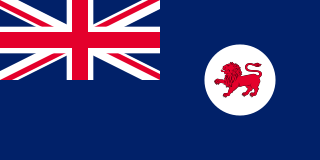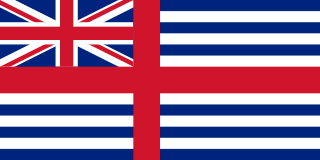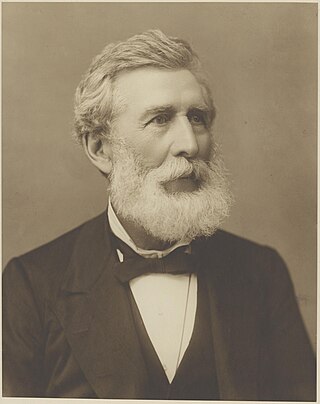Related Research Articles

Tasmania is an island state of Australia. It is located 240 kilometres (150 miles) to the south of the Australian mainland, separated from it by the Bass Strait, with the archipelago containing the southernmost point of the country. The state encompasses the main island of Tasmania, the 26th-largest island in the world, and the surrounding 1000 islands. It is Australia's least populous state, with 569,825 residents as of December 2021. The state capital and largest city is Hobart, with around 40 percent of the population living in the Greater Hobart area. Tasmania is the most decentralised state in Australia, with the lowest proportion of its residents living within its capital city.

Van Diemen's Land was the colonial name of the island of Tasmania used by the British during the European exploration and colonisation of Australia in the 19th century. The island was previously discovered and named by the Dutch in 1642. Explorer Abel Tasman discovered the island, working under the sponsorship of Anthony van Diemen, the Governor-General of the Dutch East Indies. The British retained the name when they established a settlement in 1803 before it became a separate colony in 1825. Its penal colonies became notorious destinations for the transportation of convicts due to the harsh environment, isolation and reputation for being inescapable.
Henry Hellyer was an English surveyor and architect who was one of the first explorers to visit the rugged interior of the north west of Tasmania, Australia and made the most comprehensive maps of the area up to that time.

John Glover was an English-born artist. In later life he migrated to Van Diemen’s Land and became a pastoralist during the early colonial period. He has been dubbed "the father of Australian landscape painting."

Sir Adye Douglas was an Australian lawyer and politician, and first class cricket player, who played one match for Tasmania. He was Premier of Tasmania from 15 August 1884 to 8 March 1886.

Thomas Bock was an English-Australian artist and an early adopter of photography in Australia. Born in England he was sentenced to transportation in 1823. After gaining his freedom he set himself up as one of Australia's first professional artists and became well known for his portraits of colonists. As early as 1843 he began taking daguerreotypes in Hobart and became one of the earliest commercial photographers in Australia.
Michael Howe was a British convict who became a notorious bushranger and gang leader in Van Diemen's Land, Australia.
Edward Micklethwaite Curr was an Australian pastoralist, author, advocate of Australian Aboriginal peoples, and squatter.
Lady Denison was launched in 1847 at Port Arthur, Tasmania. She went missing in 1850 while sailing between Port Adelaide and Hobart, Tasmania. At the time there were strong allegations that convicts being carried on board murdered the other passengers and crew and headed for San Francisco, but all contemporary evidence supports the assertion that she sank off the far north-western tip of Tasmania.
The Colonial Times was a newspaper in what is now the Australian state of Tasmania. It was established as the Colonial Times, and Tasmanian Advertiser in 1825 in Hobart, Van Diemen's Land by the former editor of the Hobart Town Gazette, and Van Diemen's Land Advertiser, Andrew Bent. The name was changed to Colonial Times in 1828. In 1857 the title was absorbed into the Hobart Town Mercury.

The Lady Outlaw is a 1911 Australian silent film set in Van Diemen's Land during convict days.

The Bush Inn is an Australian pub and hotel located in the Derwent Valley township of New Norfolk, Tasmania. It is one of the oldest pubs in Australia, and is thought by some to be the oldest continuously operating pub in Australia. The establishment is listed on the Tasmanian Heritage Register and the Australian Heritage Database.
On 11 and 12 February 1851, teams from Van Diemen's Land and Port Phillip District played the first cricket match between two Australian colonies, recognised in later years as the inaugural first-class cricket match in Australia. It took place at the Launceston Racecourse, known now as the NTCA Ground, in Tasmania. The match was incorporated into celebrations marking the separation of the Port Phillip District from New South Wales in 1851 as the colony of Victoria.
Brisbane Street is a street in Hobart, Tasmania. The street was named for Sir Thomas Makdougall Brisbane, the sixth Governor of New South Wales.

The True Colonist Van Diemen's Land Political Despatch, And Agricultural And Commercial Advertiser was a newspaper published in Hobart, Tasmania, Australia.

Founded in 1823, the Bank of Van Diemen's Land was the first financial institution to be established in Van Diemen's Land. Affectionally referred to as the old bank, the Bank of Van Diemen's Land traded for 68 years before becoming the first major bank failure in what would eventuate into the Australian banking crisis of 1893.

William Bannon was an Irishman who served in the British 65th Regiment of Foot in the New Zealand Wars in the 1840s. In 1849 he was found guilty of desertion and theft and was sentenced to transportation for seven years to Van Diemen's Land. A reward was posted for Bannon's capture after he escaped from a prison in Van Diemen's Land and, following his capture, he was transported to Norfolk Island before returning to Australia. "Murdering Gully Rd" at Table Cape, Tasmania is named after a murder that Bannon was accused of committing in 1858.

Francis Burgess (1793–1864) was an English barrister, the first police commissioner for Birmingham, England, and subsequently chief police magistrate of Van Diemen's Land, and served as a Member of the Van Diemen's Land Legislative Council.
Charles Beaumont Barnes Grubb was an Australian politician.

Michael Howe, The Terror of Van Diemen's Land is an 1821 British play by John H. Amherst about the bushranger Michael Howe. It was the first play ever written about Tasmania.
References
- ↑ Rees, Leslie (1953). Towards an Australian Drama. pp. 4–6.
- ↑ "Drama of Van Diemen's Land". Colonial Times . Vol. 16, no. 814. Tasmania, Australia. 30 November 1831. p. 3. Retrieved 17 November 2023– via National Library of Australia.
- ↑ "Drama". The Sydney Monitor . Vol. IV, no. 439. New South Wales, Australia. 21 December 1831. p. 2 (Morning). Retrieved 17 November 2023– via National Library of Australia.